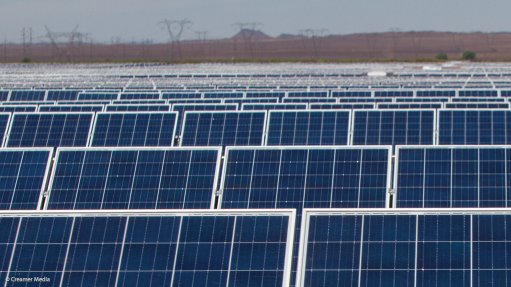
Photo by: Creamer Media
The National Energy Regulator of South Africa (Nersa) has confirmed that it will implement the Operation Vulindlela recommendation that power purchase agreements (PPAs) should not be a requirement for registration of embedded generation projects below 100 MW.
The regulator tells Engineering News that it is currently following procedures to inform the Nersa governors of the change to the registration requirement for qualifying projects.
Nersa also confirmed that it is prioritising the automation of the registration process as part of a broader strategy to automate its business processes.
“This will ensure the much-needed investment in new generation capacity is added to the grid as soon as possible.
“This will also alleviate load-shedding being experienced in the country,” Nersa said in reply to questions posed by Engineering News.
The regulator has already committed to reducing its registration processing time from 60 to 45 days and has indicated that it plans to use automation to shorten the timeframe even further.
It recently took 73 days for the regulator to register two 100 MW solar photovoltaic projects, the first projects above 10 MW to be registered to date.
The projects, which are both located in the North West province, are being developed, financed, constructed and operated by the Sola Group for Tronox Mineral Sands.
Other smaller projects have been registered, however, with Nersa informing Engineering News that, for the year-to-date, it had registered 111 qualifying projects.
“Registrations are done every month during the Regulator Executive Meetings which are conducted twice monthly.”
CEO Advocate Nomalanga Sithole told Parliamentarians earlier this month that Nersa would continue to refine its regulatory practices and methodologies in a bid to become a recognised world-class leader in energy regulation.
She indicated, however, that shifting from manual to automated processes would require it to invest in its information and communication technology systems.
Nersa reports that the automation project is at a preliminary stage and that no budget has yet been set, or service provider appointed.
“No funding has been provided for, but the initial work will be insourced within Nersa.”
The decision to implement the Operation Vulindlela recommendation regarding PPAs is anticipated to help unlock an investment pipeline of more than 50 projects, with a combined energy generating potential of about 4 500 MW.
The Presidency’s project management office head Rudi Dicks has reported that Operation Vulindlela is seeking to remove obstacles to individual projects, as well as to address any remaining systemic constraints.
Besides addressing onerous registration requirements, attention is being given to reducing the time it takes to process environmental impact assessments and secure water-use licences, as well as to creating dedicated capacity in Eskom to process grid-connection applications more quickly.
Dicks told delegates to the Mpumalanga Energy Summit this week that he expected the “floodgates to open” on further project approvals.